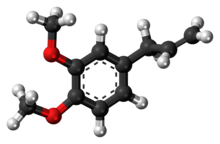Methyl eugenol
Methyl eugenol (allylveratrol) is a natural chemical compound classified as a phenylpropene, a type of phenylpropanoid. It is the methyl ether of eugenol and is important to insect behavior and pollination.[1] It is found in various essential oils.
 | |
 | |
| Names | |
|---|---|
| Preferred IUPAC name
1,2-Dimethoxy-4-(prop-2-en-1-yl)benzene | |
| Other names
4-Allyl-1,2-dimethoxybenzene Allylveratrol 4-Allylveratrol Eugenol methyl ether Methyleugenol | |
| Identifiers | |
3D model (JSmol) |
|
| ChEBI | |
| ChEMBL | |
| ChemSpider | |
| ECHA InfoCard | 100.002.022 |
| EC Number |
|
| KEGG | |
PubChem CID |
|
| UNII | |
CompTox Dashboard (EPA) |
|
| |
| |
| Properties | |
| C11H14O2 | |
| Molar mass | 178.231 g·mol−1 |
| Density | 0.98 g/cm3 |
Except where otherwise noted, data are given for materials in their standard state (at 25 °C [77 °F], 100 kPa). | |
| Infobox references | |
Methyl eugenol is found in a number of plants (over 450 species from 80 families including both angiosperm and gymnosperm families) and has a role in attracting pollinators. About 350 plant species have them as a component of floral fragrance. Their ability to attract insects, particularly Bactrocera fruit flies (particularly, Bactrocera dorsalis male flies) was first noticed in 1915 by F. M. Howlett. The compound may have evolved in response to pathogens, as methyl eugenol has some antifungal activity. It also repels many insects.[2]
As of October 2018, the US FDA withdrew authorization for the use of methyl eugenol as a synthetic flavoring substance for use in food because petitioners provided data demonstrating that these additives induce cancer in laboratory animals. FDA noted the action was despite its continuing stance that this substance does not pose a risk to public health under the conditions of its intended use.[3]
From 2021 any product that contains more than 0.01% of Methyl Eugenol has to be stated as per the CPL regulations (Regulation (EC) No 1272/2008) [4]
See also
References
- Tan, Keng Hong; Nishida, Ritsuo (2012). "Methyl Eugenol: Its Occurrence, Distribution, and Role in Nature, Especially in Relation to Insect Behavior and Pollination". Journal of Insect Science. 12 (56): 1–60. doi:10.1673/031.012.5601. PMC 3500151. PMID 22963669.
- Nishida, Ritsuo; Tan, Keng Hong (2012-01-01). "Methyl eugenol: Its occurrence, distribution, and role in nature, especially in relation to insect behavior and pollination". Journal of Insect Science. 12 (1): 1–60. doi:10.1673/031.012.5601. PMC 3500151. PMID 22963669.
- 83 FR 50490
- https://eur-lex.europa.eu/legal-content/EN/TXT/?uri=CELEX%3A32008R1272